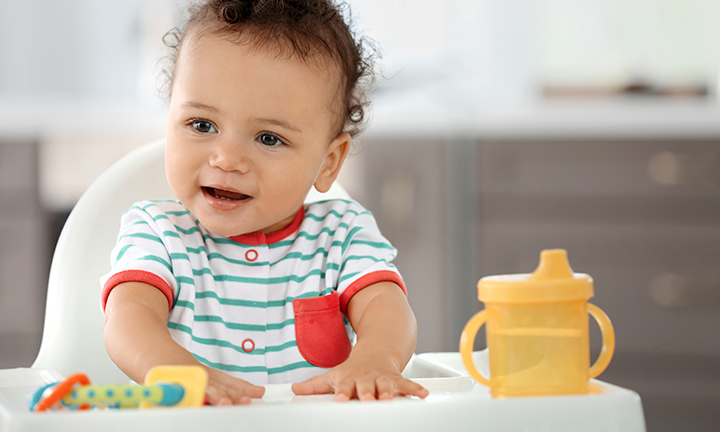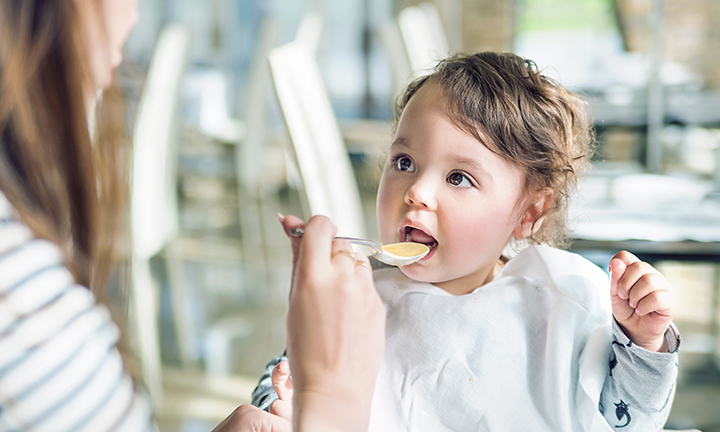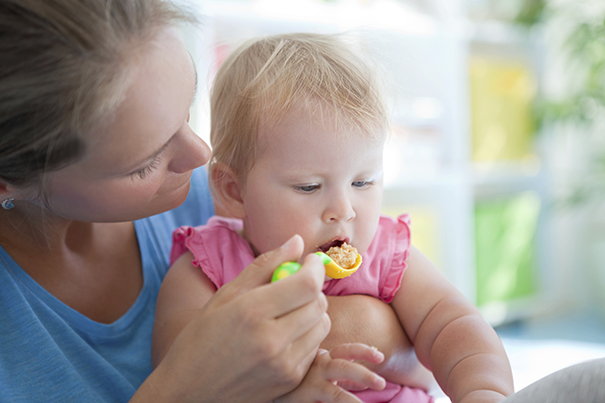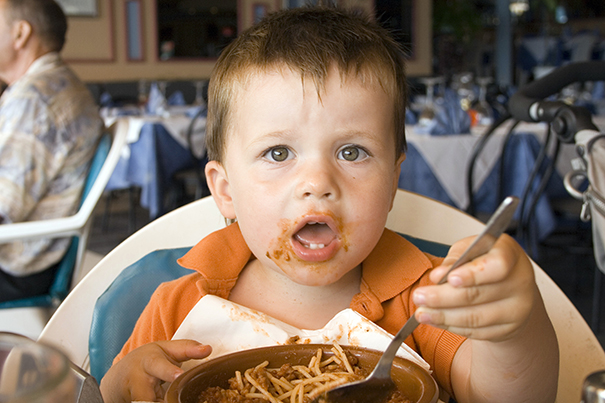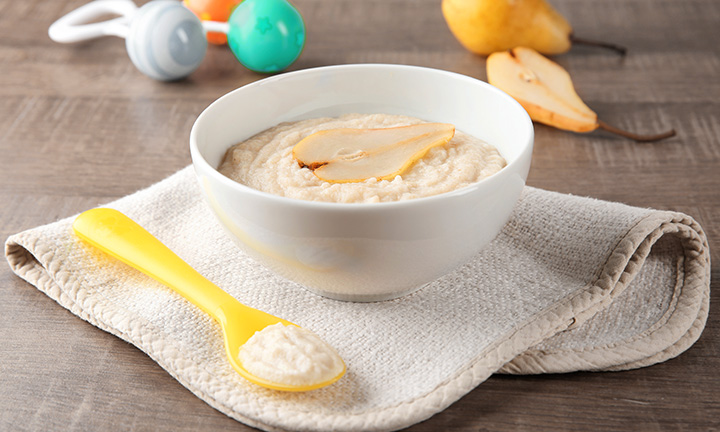
Food Allergies in Babies
At around 6 months old, your baby is ready to begin eating solid food. Although in most cases this can be a magical (if sometimes messy) adventure, some babies can react badly to certain foods. Read on to learn what exactly a food allergy is, what some common food allergies are, how to spot the symptoms and what to do if your baby has an allergic reaction.
What Are Food Allergies?
An allergy is the immune system's response to something it doesn't like. Things that trigger an allergic reaction are called allergens. For example, some people are allergic to dust or pollen and get itchy eyes or a runny nose when exposed to these allergens. With food allergies, most people react with digestive problems, itching, rashes or breathing problems. Babies who have food allergies usually experience them before the age of 3. The good news is that children often grow out of these early food allergies. Although the causes of food allergies in babies are not fully understood, it is known that if your baby has eczema there’s a higher chance of him or her also developing a food allergy. Luckily severe allergic reactions are rare, but if they do occur it’s important to get treatment immediately. This is why it’s important to know what an allergic reaction can look like and what to do if you suspect your baby has a food allergy.
Signs and Symptoms of Food Allergies
The symptoms of a food allergy, and how soon they appear, depends on the antibodies released into the body when the reaction is triggered. There are three main types of food allergy:
IgE-Mediated Food Allergy
The most common kind of food allergy is where your child’s body – for unknown reasons – releases an antibody called immunoglobulin E (IgE) in response to harmless proteins in the food that has triggered the allergic reaction. The symptoms of this kind of allergy usually appear within a few seconds or minutes after eating the food, and include:
A red, raised itchy rash (hives) or just patches of red, itchy skin
Sneezing and/or itchy eyes
An itchy throat and tongue
Swelling of the mouth, throat or other parts of the body
Feeling sick or vomiting
A tummy ache or diarrhoea
Anaphylaxis. In rare cases an allergic reaction can be very severe, with symptoms that include difficulty breathing, speaking or swallowing. This condition is a medical emergency that requires urgent treatment.
Non-IgE-Mediated Food Allergy
Some food allergies act via other cells in your baby’s immune system. These types of food allergies are known as non-IgE-mediated. This kind of allergy is harder to diagnose, and the symptoms may appear later – sometimes several days after eating the food that triggers it. The symptoms can include:
Mixed Allergic Reaction
Sometimes, children or babies show a mixture of IgE and non-IgE symptoms. For example, your little one might have swelling or hives as well as constipation. This could be a sign that your baby has a cow’s milk allergy (CMA). However, only your child’s doctor can make an accurate diagnosis, so if you’re unsure what may be causing your little one’s symptoms seek medical help.
When to Call the Doctor
It’s important to notify your doctor if you see any of the above food allergy symptoms. A doctor might prescribe or recommend an antihistamine medicine to help relieve the symptoms of a mild allergic reaction.
After ruling out any other possible causes, your doctor will also refer your child to an allergy clinic so you can get a proper diagnosis of the allergy and a plan for making any necessary changes to your child’s diet.
Anaphylaxis This is a rare but severe type of allergic reaction that needs urgent treatment. Call 999 and ask for an ambulance immediately if you notice any of the following signs (either with or without the other allergy symptoms described above) in your baby:
Common Foods That Cause Allergic Reactions
Here’s a list of the foods that are most likely to trigger an allergy in your baby or toddler:
As you can see, there is a bright side to some of this: Many children outgrow food allergies, especially when it comes to eggs, milk, wheat and soya. Speak to your child’s doctor or your health visitor if you have any questions about your baby’s food allergy and what steps you can take to reduce the risks of exposing your baby or older child to the allergen.
What's the Difference Between a Food Allergy and a Food Intolerance?
Sometimes children aren't allergic to a certain food, but instead have an intolerance for it. Intolerance of certain foods (basically an inability to digest the food) is less serious than a food allergy (which can result in a very serious allergic reaction) but it can still be an uncomfortable problem. A common food intolerance is milk and dairy intolerance, when your baby’s digestive system has trouble processing lactose, which is the natural sugar found in milk and other dairy products. The symptoms of food intolerances can usually be controlled through dietary changes, but the precise treatment depends on how mild or severe the intolerance is. Some of the symptoms may be similar to those of an allergy – or some other common childhood illnesses – so it’s important to see your child’s doctor for a diagnosis. Food intolerance symptoms usually appear a few hours after eating the food. They can include:
Can You Prevent Food Allergies?
There is no sure-fire way of preventing allergies in your child, but experts believe that waiting too long before introducing certain potential allergens to your baby’s diet may increase the risk of becoming allergic to them. Peanut and egg allergies, for example, may be more likely to develop if your child doesn’t encounter them until after 6 to 12 months old. Still, as you start your baby on solid foods it’s important to introduce possible allergenic foods carefully – in very small amounts at first, and one at a time so you’ll know what’s caused any reaction that does occur. Talk to your health visitor if you’re unsure how to safely introduce new foods to your baby or toddler .
How Are Food Allergies Diagnosed?
If you suspect your baby has an allergy or food intolerance, it’s important to make an appointment with your child’s doctor.
It's not a good idea to try to make your own diagnosis, and experts warn strongly against using home testing kits that may be available in the shops.
Your doctor will ask questions about your child’s symptoms, their severity and exactly how and when they appeared. You may also be asked whether anyone else in your family has allergies.
Then, based on the answers your baby may be referred to an allergy clinic for one or more of the following allergy tests:
What to Do If Your Baby Has Been Diagnosed With a Food Allergy
If your baby or toddler is diagnosed with a food allergy, it's best to begin avoiding that specific food immediately, even if the allergic reaction isn't a serious one. You'll need to be very mindful of what foods your baby or toddler is going to eat at all times, especially if it's food you didn't prepare. However, it’s important not to eliminate important food groups – such as dairy – from your child’s diet without discussing the changes with your doctor first.
Check Ingredient Labels
Be aware that many shop-bought foods contain traces of allergens, so you’ll need to start reading all product labels to make sure you aren't accidentally giving your baby or toddler something he or she may have an allergic reaction to. Unpackaged foods – like bakery or delicatessen-counter products – may not be labelled in the same way as pre-packaged food. Look for signs in the shop providing information about allergens or ask a member of staff. It's also a good idea to make sure your kitchen cupboards don't contain foods that contain traces of the allergen – you never know when your curious toddler may get hold of something he or she shouldn't be eating.
Precautions to Take With Serious Food Allergies
If your child has been diagnosed with a serious food allergy that can result in life-threatening anaphylaxis, the doctor will prescribe a special adrenaline auto-injector. Adrenaline is a life-saving hormone that narrows blood vessels to prevent a drop in blood pressure and opens up the airways to counter breathing difficulties. You’ll need to learn how to use the device so that you can inject it immediately in case your little one experiences an anaphylactic reaction. Read the manufacturer’s instructions carefully, especially the guidance on how to store and use the auto-injector. When your child is old enough, you should teach him or her how to self-administer an injection in an emergency. You’ll also need to make sure everyone who cares for your little one (including grandparents and babysitters, for example) knows how to use the injector, and you'll need to remember to replace the injectors when they expire. Caregivers, day care staff, nursery-school teachers, and friends and family members who care for your baby or toddler should all be aware of your child’s allergies and know what to do if an anaphylactic reaction occurs.
FREQUENTLY ASKED QUESTIONS
Symptoms of a food allergy can include:
- Diarrhoea
- Vomiting
- Itchy skin or rash
- A cough
- Sore or itchy eyes
- Runny nose
- Swollen lips
- Anaphylaxis (a rare but severe reaction that needs urgent treatment. Call an ambulance if your child has trouble breathing or swallowing, seems dazed or falls unconscious.).
The Bottom Line
If your baby or toddler is diagnosed with a food allergy, it may mean avoiding that food altogether, and making sure that everyone around him or her is knows exactly what to do if he or she has a severe allergic reaction. Luckily, many food allergies are outgrown by school age, and those that aren’t can be managed by being extra vigilant of what your little one eats or has access to. Like so many other aspects of parenting, this will probably soon become second nature – and you’ll be able to focus on the more enjoyable side of watching your little one grow and explore the world.
- NHS: Allergies
- NHS: Food allergies
- NHS: Food allergy
- NHS: Food allergies in babies and young children
- NHS: What should I do if I think my baby is allergic or intolerant to cows milk?
- NHS: Nut allergies
- NHS: Allergy Clinic Pre-appointment advice for Children & Young people: Peanut and Tree Nut
- NHS: Foods to avoid giving babies and young children
- NHS: Soya bean allergy
- NHS: Should you cut out bread to stop bloating?
- NHS: Fish allergy
- NHS: Food reintroduction
- NHS: Lactose intolerance
- NHS: Food intolerance
- NHS: Anaphylaxis
- NHS: New Treatment to Reduce Effects of Peanut Allergy to Benefit Thousands of Children
Read more about Baby
Join Pampers Club and get:




